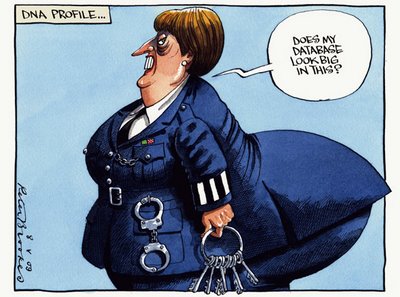Did you notice anything missing over the past few months? That slight feeling of dread which you could constantly feel in the marrow of your bones? That cloud of doom which had hung over the country ever since 7/7, being whipped up at least once a year by either further supposed disruptions of supposed plots or by newspapers demanding that we wrap ourselves in the flag in the face of such unmitigated horror as two idiots succeeding in only setting themselves on fire.
For a while this year, since the Manchester raids turned out to be the latest example of "security sources" briefing their poisonous hyperbole to an ever compliant media, we've actually had something approaching a thaw, helped along both by the actual reduction in the supposed threat level from severe to substantial, and also MI5's own acknowledgement that there are now less "active" plots than there were previously. Considering the claims that there was up to 30 active plots and 2,000 individuals dedicated, presumably, to the militant variety of radical Islam, this was a sudden turn around and still remains so. In line with this, we've had less blatant scaremongering, including from the worst offender, the Sun. The recession and expenses scandal have of course helped also.
OK, perhaps that's a little unfair to the Sun, but not by much. As per usual though, the story doesn't live up to its billing:
FORTY convicted Islamic terrorists are back on the streets after being released from jail, a Sun investigation has revealed.
"Islamic terrorists" as a description is being used rather loosely here. Almost all the "big names", which is another loose description, have not been released yet, as we'll come to. In fact, the biggest name that has already been released is Abu Bakr Mansha, a quite clearly deadly individual. When arrested, Mansha had a blank firing pistol, which someone had been attempting to convert to fire live ammunition, a balaclava, a Sun newspaper article on a soldier who had won the military cross, and the soldier's former home address, as well as the expected radical material. Mansha though also happens to have an IQ of 69, and allegedly gave the "intelligence" which led to the Forest Gate raid. Truly someone to worry about.
The others already released are in much the same category, and so dangerous that the Sun doesn't actually name them. According to the paper, at least three of those convicted in connection with the 21/7 attacks have been released. This would be surprising for the fact that as far as I'm aware, the shortest sentence passed was six years and nine months, which even with the deductions made for current overcrowding and for time spent on remand would seem to have been released early, although the sentences could have been reduced on appeal. None of these individuals were charged with directly helping with the bombings; they provided sanctuary or helped after they had failed, while others were either relatives or wives that helped. The vast majority of these are unlikely to be "fanatics" but helped out of friendship or even because they were under pressure to. The organisers of the Danish embassy protests have also been released, unsurprisingly, given that however disgraceful the views expressed, there was no action behind the words, and considering that they seem to be from the usual suspects who are all mouth and no trousers. Others include those involved on the periphery of the Birmingham beheading plot, on similar charges to the 21/7 accomplices of not disclosing what they knew even if they weren't involved, while one was convicted of having the "Encyclopaedia Jihad". Two had helped the ringleader, who has not been released, with supplying equipment to fighters in Pakistan, but again that doesn't specifically involve any sort of violent threat in this country. Those involved with an Islamic school in Sussex have also been released, such an important set of convictions that there seems to be very little on it anywhere. That doesn't begin to add up to 40 but we'll let the Sun off.
How about those soon to be released then? We'll, there's Sohail Qureshi, not to be confused with the Canadian "terror suspect". Qureshi was arrested when attempting to travel to Pakistan, and had night vision equipment, medical supplies and £9,000 in cash in his bag. Material was found where he talked of hopefully "kill[ing] many", and presumably hoped to join fighters in Afghanistan. Sentenced to four and a half years, with time on remand and reductions, he's meant to be released next month, which will still mean he's served 3 years. The judge said his offences were at the "lower end of the scale", and while undoubtedly he could be a threat, with careful supervision and the confiscation of his passport there doesn't seem to be any reason why he shouldn't be released. Much the same is the case with the next person mentioned, "[H]ulking thug Andrew Rowe", who Peter Clarke, that former king of hyperbole as anti-terrorist chief at the Met, called a "global terrorist". In reality the evidence against him amounted to the usual radical material, supposed code referring to attacks and a guide on how to fire mortars. Oh, and don't forget the socks bearing traces of high explosive. How dangerous he truly was or is is anyone's guess, as he was under careful police supervision prior to his conviction.
Next up is the other "shoe bomber", Saajid Badat, who had meant to carry out an attack on a plane at the same time as Richard Reid, but pulled out at the last minute, also cutting himself off from his handler in Pakistan. Considering that he failed to go through with the attack and also seems to have been about to settle down when he was arrested, the threat he poses seems low to negligible. Finally, we have Kazi Nurur Rahman, who had links to the fertiliser bomb plotters, and probably the most serious risk as a result. He was however entrapped by the police and security services, and there was no evidence whatsoever that he actually had the money to buy the weapons beyond the 3 Uzis which he agreed to purchase. Again though, there is no reason why he shouldn't be able to be handled by MAPPA.
There are other problems with the Sun's story beyond the actual facts. Does anyone really believe that a "senior security source" genuinely told the Sun this?:
If this was the United States, a great many of these people coming out soon would have been sentenced to 99 years and locked away for the rest of their lives.
But in this country much weaker sentences have been handed down and a large percentage of them have received reductions from the Appeal Court.
As a result, we are faced with an extremely worrying situation. We have got to hope these people come out without violent extremist views. But the likelihood of that is slim.
This simply isn't true in any case: Jose Padilla for example, convicted of charges similar to some of those here, received 17 years and four months. The wife of one of the 21/7 bombers received 15 years just for the help she provided.
Then of course we have the views of the contacted politicians, including the egregious Chris Grayling:
IT'S time to get tough on the extremists.
Yawn.
It's time we stopped these people from operating in our society. Yet the preachers of hate continue to preach.
Who? Where, Chris? The idea that it's still preachers of hate behind most of the radicalisation is years out of date.
It's also time we outlawed radical groups who propagate extremist views and in doing so incite violence against innocent people.
So you're going to ban the BNP and other neo-Nazis are you Chris? Good luck! As for the Sun's editorial, it calls those released and soon to be released a "Terror army". I don't think they're going to be challenging any of the more famous fighting units any time soon.
There were two other more important terrorism stories yesterday which didn't make the Sun's front page. There was, oh, err, a huge fucking bomb discovered on the Northern Ireland border, twice the size of the one which caused the largest single loss of life during the Troubles in Omagh in 1998. The Real IRA just aren't as sexy or as terrifying as the "terror army" though. Or there was Neil Lewington, given an indeterminate sentence with a minimum of 6 years for carrying what were glorified Molotov cocktails with him, supposedly on the cusp of a "terror campaign". He though was white and a neo-Nazi, even though he was actually more prepared and ready to carry out attacks than the liquid bomb plotters were, who hadn't constructed any devices while some didn't even have passports. Terror though no longer just corresponds to individual nutters and old, boring causes: it's planes exploding one after another however implausible and however well covered they are by the security services. If we're left meant to be fearing those who were stupid enough to get caught once, then we really are scared of the wrong people.Labels: al-Qaida, civil liberties, jihadists, liquid bombs plot, media reporting, scaremongering, Scum-watch, security services, Sun-watch, terror, terror suspects





